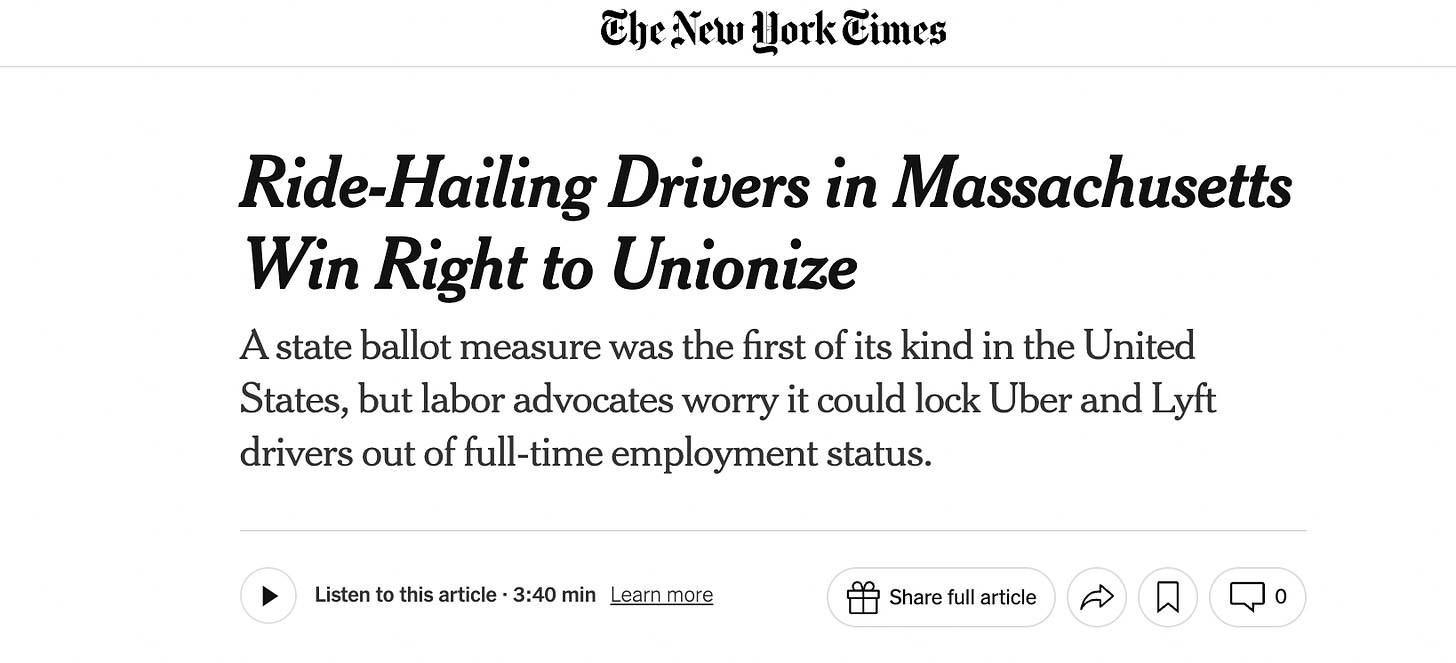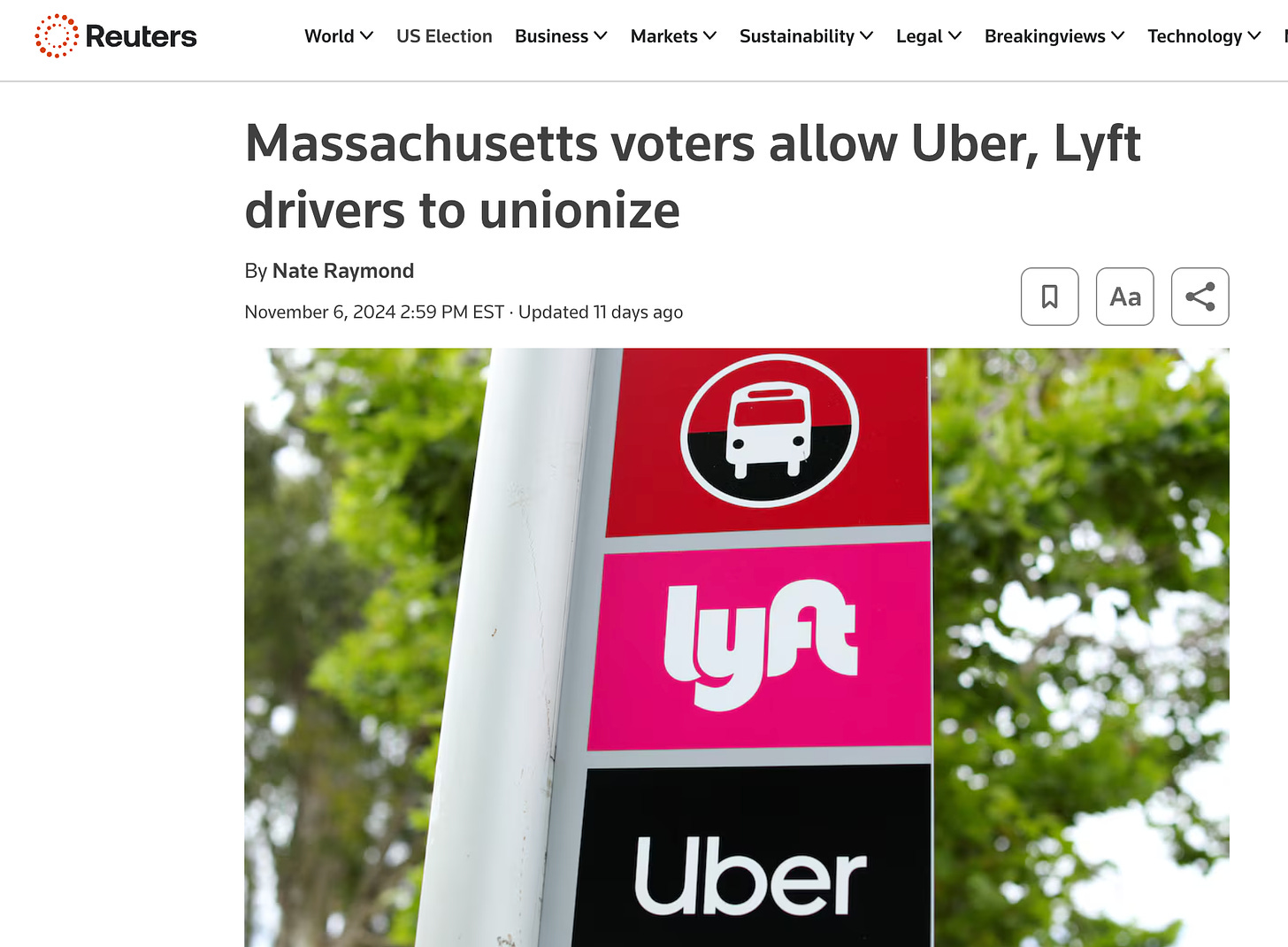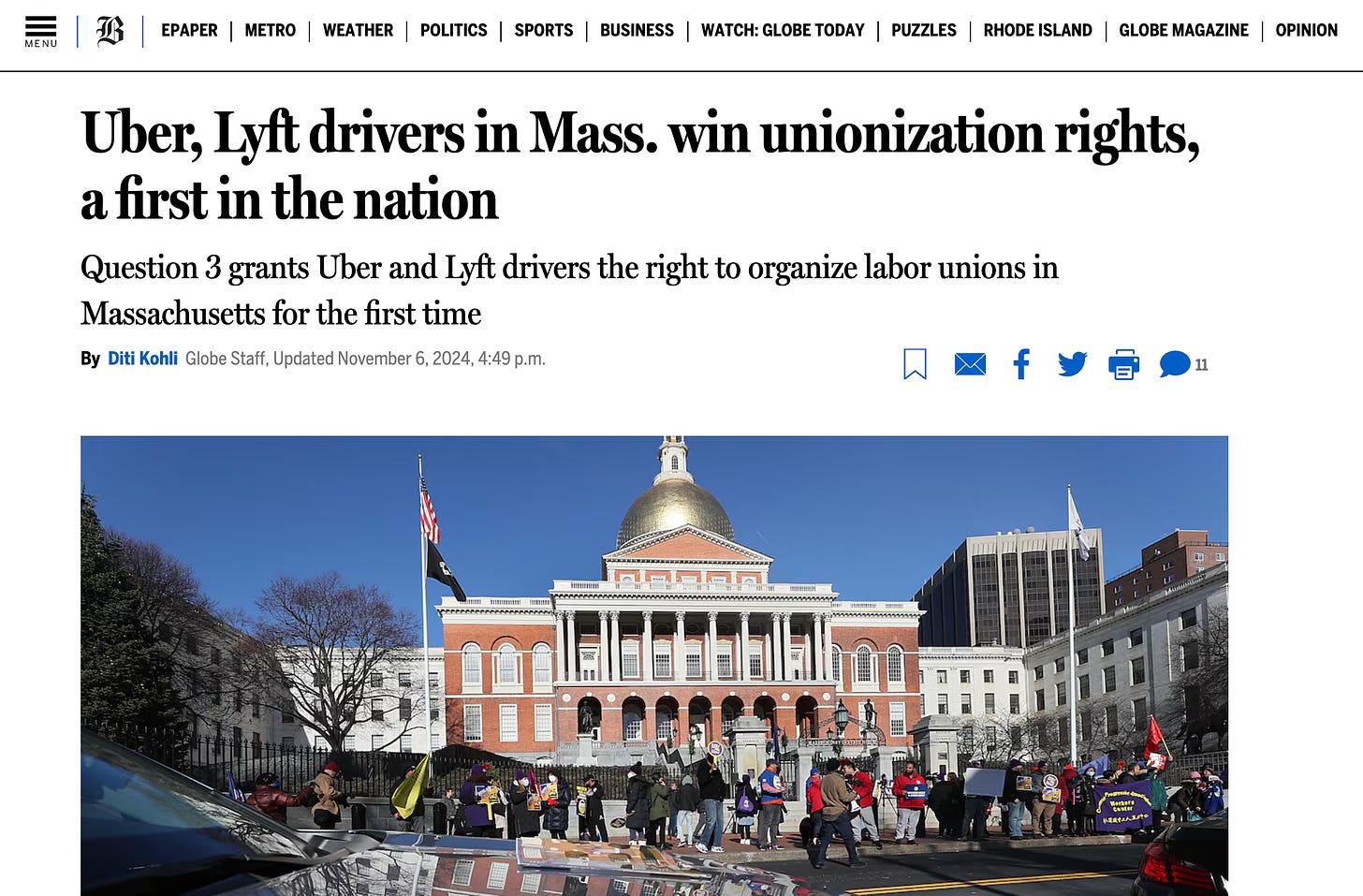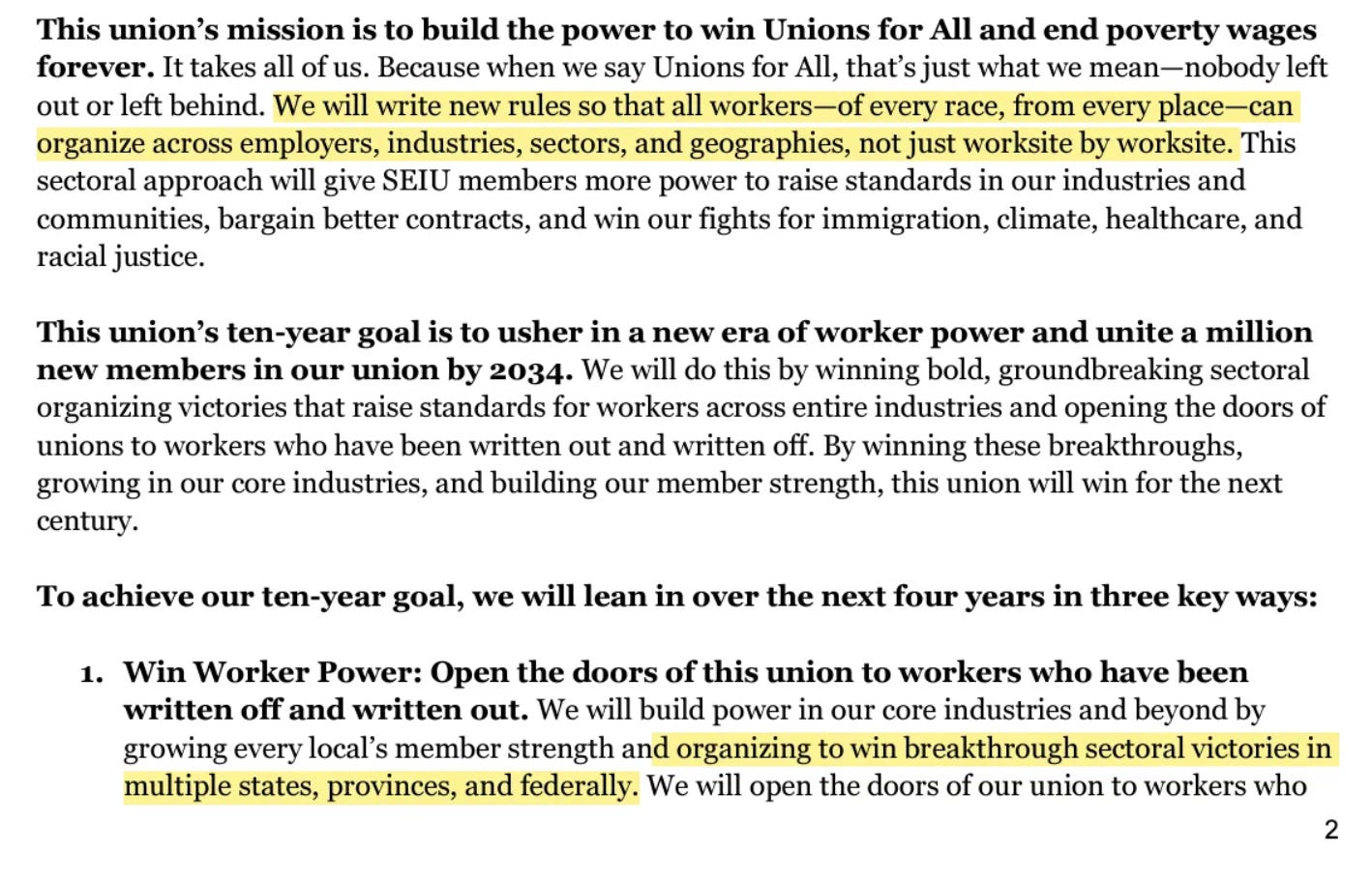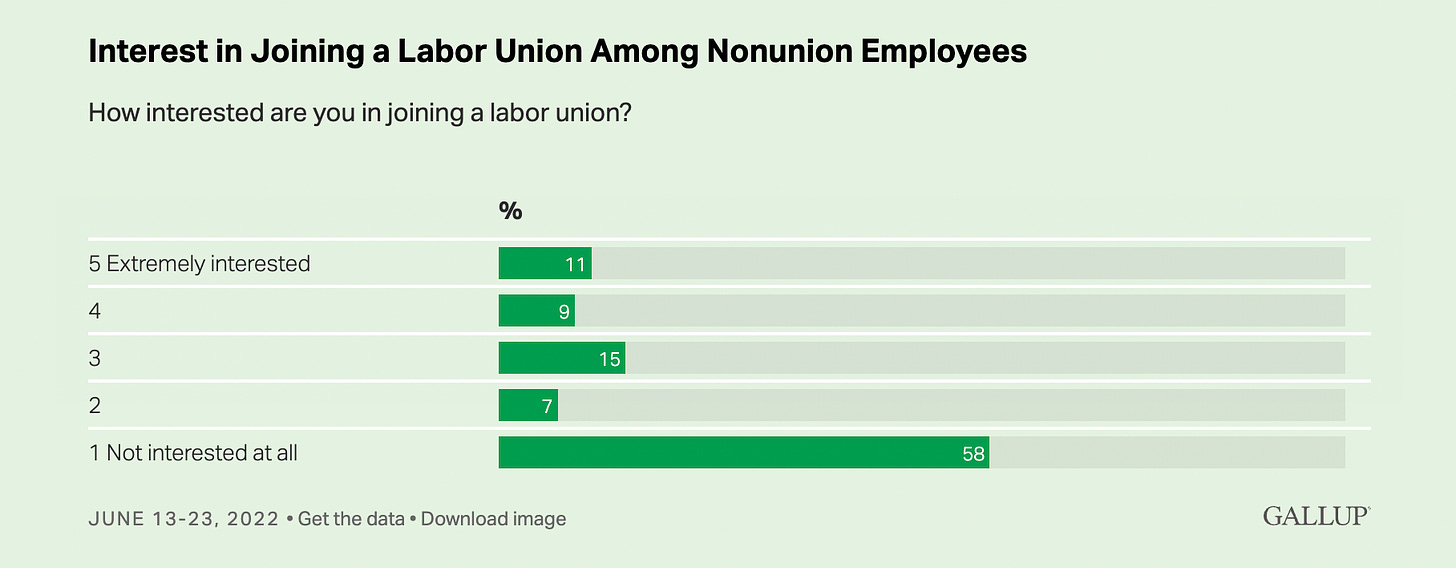Plan B is Activated
Amid the red wave, this blue-state win is the freelance-busting brigade's next strategy to restrict our freedom of self-employment.
Back in July, I published a piece called “We Need to Talk About Sectoral Organizing.” In the deepest circles of labor and employment law, I was hearing smart people express real concern about how sectoral organizing—sometimes called sectoral bargaining or cartel bargaining—was shaping up to be the next strategy in the freelance-busting brigade’s attack on everyone’s freedom to be self-employed.
I wrote at the time:
In recent years, this freelance-busting brigade has focused on trying to rewrite state and federal laws and regulations in ways that reclassify most or all of us as employees who are eligible for unionization. Where they have succeeded, such as with California’s Assembly Bill 5, they have destroyed independent contractors’ incomes and careers while gaining no lasting increase in union membership.
As a result, this form of freelance busting has faced not only bipartisan lawmaker resistance, but also strong public pushback—and rightfully so.
Thus, the unionists are seeking another option. They are signaling that their next attempt will be to achieve their goals through sectoral organizing.
A couple months later, in September, the U.S. Chamber of Commerce released a report titled Cartel Bargaining, Ballot Initiatives, and Industrial Democracy: How Unions are Using Government to Circumvent the NLRA and End Labor Market Competition.
Based on what that report said, I published this Q&A with Glenn Spencer, senior vice president of the U.S. Chamber of Commerce Employment Policy Division.
He told me:
“Plan A is the PRO Act. That is the unions’ top priority, even if unions like the Teamsters don’t find every part of the PRO Act necessary.
But since that legislation has been hung up in Congress, cartel bargaining, preferably to cover independent contractors, is plan B.
Today, post-election, a labor and employment attorney from Littler told me:
“Certainly the PRO Act is dead.”
In other words, the fact that Republicans took the White House and both chambers of Congress means the freelance-busting brigade’s Plan A is dead—but it doesn’t mean their goals have changed. They are playing a long game of chess, not a short game of checkers.

Make no mistake: Our opponents still want to restrict or outright end our ability to remain self-employed. They want to force as many of us as possible into traditional, unionizable jobs, even against our clearly stated desire to remain self-employed.
They are now turning to Plan B, which is sectoral organizing. And they notched a big win in the recent election with a ballot proposition in Massachusetts—a win that the mainstream media is heralding as a good thing.
In fact, the same pro-union media bias that we saw with reclassification attempts such as Assembly Bill 5 and the PRO Act is simply resetting and restarting anew. Now, it’s being used to promote this other way of trying to limit self-employment.
Remember as you read these headlines about the Massachusetts election outcome that union organizers sponsored this Massachusetts ballot measure, while most rideshare drivers say they wish to remain their own bosses:
In fact, the same “expert sources” who were all over the press in recent years claiming that widespread independent-contractor reclassification through AB5-type laws was a good thing—when it actually was a career and business killer in California—are the same “expert sources” now being quoted on this idea of sectoral organizing.
The New York Times piece on Massachusetts Ballot Question 3, for instance, quotes:
Katie Wells, whom you may remember from her testimony before Congress that lawmakers should unionize independent contractors against their will;
April Verrett, president of the SEIU, whom you may remember as the union leader with plans to ensnare not just every employee the country, but also every independent contractor;
Veena Dubal of the University of California, who has written repeatedly about the perils of “gig work” and gone so far as to suggest that the freelance-busting brigade should embrace the language of racism to try and limit self-employment.
As has become a pattern with this kind of advocacy reporting (some would call it union propaganda), there is no meaningful explanation of the bigger freelance-busting war that led to this Massachusetts ballot measure. There is no acknowledgment that most independent contractors wish to remain self-employed. Variations on the word “protect” are peppered throughout the article, as if that’s the only thing sectoral organizing could possibly do.
And, yet again, the headlines about Uber and rideshare are misleading. Yes, this particular Massachusetts ballot measure is specific to the rideshare industry, but sectoral organizing is a freelance-busting strategy, just as widespread independent-contractor reclassification was a freelance-busting strategy. Making Uber and Lyft the bogeymen is a way to distract all the rest of us from the bigger unionization goal.
Here’s how the SEIU—which backed the Massachusetts ballot proposition—describes its overall plans for sectoral organizing, in its own words:
This isn’t just about Uber and Lyft.
It’s about everyone who wishes to be our own boss.
Sectoral organizing is yet another effort to find a legal way around existing laws that protect independent contractors from union organizers who want to restrict or outright end our freedom to be self-employed.
What is Sectoral Organizing?
Sectoral organizing is a different type of unionization than what we’re familiar with in the United States.
Here, unions are legally required to organize a single company at a time. They can’t unionize the whole auto industry at once; they first have to get employees at a Ford plant to unionize, then go to a Chevrolet plant, and so forth.
In legal lingo, unions have to focus their organizing efforts on a single enterprise. They have to go one company at a time, giving the employees a vote about whether or not to unionize. Our system is called enterprise bargaining. It’s a voluntary process.
With sectoral organizing, that enterprise limitation is removed.
Under the sectoral scheme, the government creates councils to set standards for an entire industry at once. These councils are composed of government-chosen experts. The result is a council of union organizers with the power to set an industry’s standards—while the people those standards affect, employees and independent contractors alike, never get a vote on whether to unionize.
Sectoral organizing, if it becomes the norm in the United States, could be done with any industry: publishing, trucking, translation, anything. And the entire concept flies in the face of what most people in the United States say we want.
Some 62% of Americans say they would prefer to be their own boss. And a full 80% of Americans say they have no interest in joining a union, or are at best neutral on the subject:
Completely ignoring that reality, the successful ballot question in Massachusetts means the Commonwealth’s government can now designate a single, all-powerful union to bargain about things like wages and working conditions for every rideshare driver in Massachusetts—regardless of whether drivers are employees or if they wish to join the union. The proposition usurps antitrust laws, and it requires transportation companies to hand over every requested driver’s name, contact information and driver’s license number.
In my opinion, another way to describe it is creepy as hell.
A similar “sectoral bargaining” push is already underway for the restaurant industry in California, also backed by the SEIU. In Minnesota, they’re talking about the property-services industry. The Massachusetts ballot question is not a one-off. It’s part of a nationwide rollout of a new unionization strategy.
Here’s how the attorney from Littler explained the post-election situation in Massachusetts to me:
“The rideshare companies have issued some statements suggesting that the Massachusetts Legislature needs to fix this, but the question is how to fix it.
“The Massachusetts situation is very disturbing, because it's similar to the Fast Food Council in California. Unionization is going to be done through the groupings of people.”
This is no bueno for independent contractors, and we need to prepare now to fend it off in the 15 states where Democrats have trifecta control of government. It doesn’t matter which industry is being targeted with any specific state initiative—our opponents’ goal is to normalize the overall concept of sectoral organizing.
Just as we saw with California’s AB5, once the freelance busters get an idea through in a Democratic-trifecta state, they try to copy it in as many other Democratic-trifecta states as possible. After that, they look for opportunities at the federal level. Think about the past five years and the strategy of independent-contractor reclassification: California’s AB5 evolved into New Jersey’s S4204, New York’s S6699A, the federal PRO Act and the Biden administration’s independent-contractor rule.
The same pattern will repeat with sectoral organizing too, unless a meaningful resistance coalesces now.
How to Fight Back
The biggest problem we’ve had fighting the current wave of freelance busting is that even after the reclassification attempts began, most people had no idea what they were. I sure had no clue that anything like it was possible until the legislation was bearing down upon us all in California and New Jersey, and then in Washington, D.C.
It’s a nightmare to try and undo this kind of thing after it gets into law. Those of us who found ourselves caught in the crosshairs of reclassification had to get a crash course in labor and employment law; create grassroots groups to defend our chosen careers; and go all the way to the U.S. Congress and the federal courts to protect our livelihoods.
The way to think about sectoral organizing right now is that it’s California’s Assembly Bill 5 back in 2018, when there was still a chance to stop it. This is the time to kill the whole concept of sectoral organizing in the cradle.
If you live in Massachusetts, call your lawmakers and express your outrage about Ballot Proposition 3. Tell them that you want a legislative solution to protect everyone’s freedom to be our own bosses, and that you do not want sectoral organizing in your state.
If you live in other Democratic Party trifecta states, be on the lookout for copycat ballot propositions or legislation—and when they show up, raise your voice. Tell your lawmakers that you oppose sectoral organizing of any kind, for any industry.
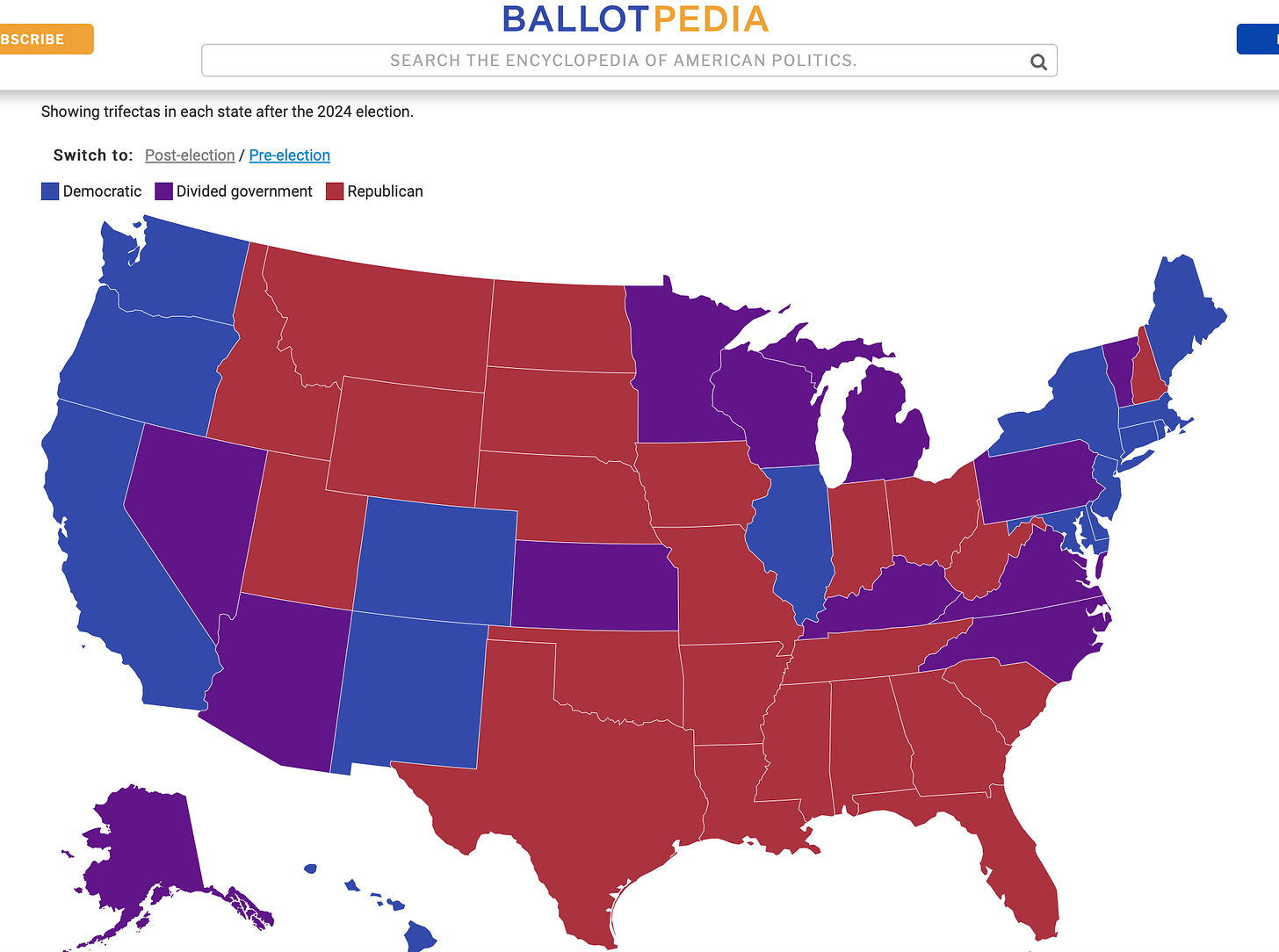
Even at the federal level, where independent contractors should be safe for at least the next few years under Republican trifecta control, we still need to keep a wary eye. Vice President-elect JD Vance seems to think sectoral organizing is an idea worth discussing. He’s talked about it more than once.
There’s nothing wrong with employees who want unions to cast a vote and choose to join unions. That has always been the norm in the United States of America.
What’s wrong is trying to force union control on employees who don’t wish to join unions, or on independent contractors who prefer to be our own bosses.
Sectoral organizing is the latter. That’s why it’s a threat to us all.



